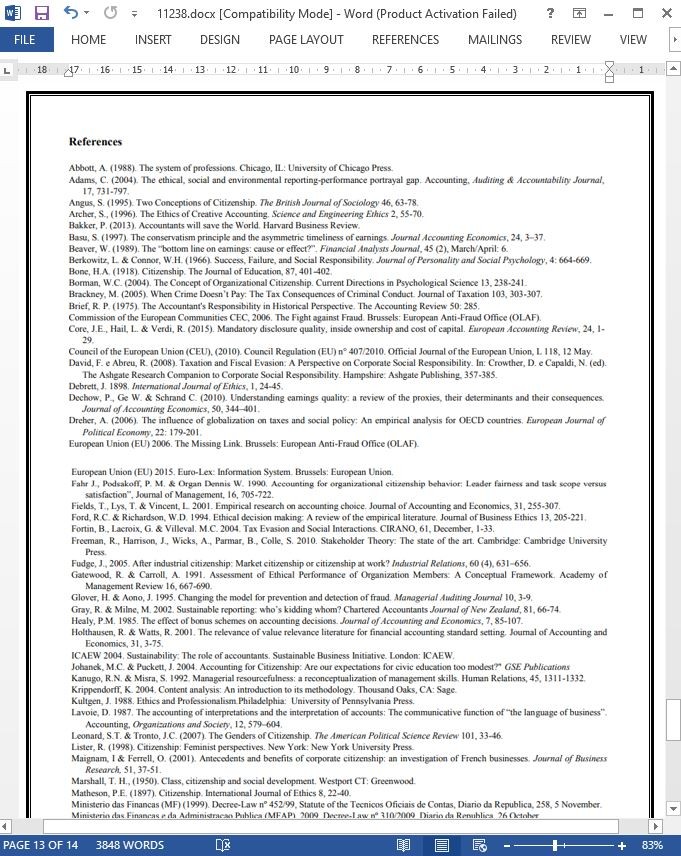
حسابداری شهروندی: نقش حسابدار
چکیده
مبحث حسابداری شهروندی، محیطی فراهم میکند که در آن سطح اعتماد شهروندان به نقش حسابدار در خصوص فعالیت تجاری افزایش مییابد. در واقع حسابدار یک سیستم اطلاعات حسابداری تهیه میکند که از زبانی تجاری برخوردار است که دارای اطلاعات مرتبط و قابل اطمینان و سودمندی است که باعث ارتقای قابلیت همسنجیپذیری، تاییدپذیری، بموقع بودن و ادراکپذیری آن میباشد و به ذینفعان امکان اتخاذ تصمیماتشان را میدهد. جهت کاهش پیچیدگی پرسش پژوهشی، نتایج نشان میدهند که دیالوگ و قضاوت، فرهنگ و هویت و خودمختاریِ حسابدار، از حسابداری شهروندی حمایت میکنند که توافق دارد شهروندان قادرند توضیحاتی را که در گزارش سالانه ارائه میشوند، درک کند بخصوص به این دلیل که سازمان باید گزارش خود را اجباراً منتشر سازند.
1. مقدمه
شورای کسب و کار جهانی برای توسعهی پایدار، انتصاب پیتر باکر را بعنوان رییس جدید شورا پذیرفته است. باکر در کنفرانس سازمان ملل که در زمینهی توسعهی پایدار برگزار شده بود، گفت:
«حسابداران دنیا را نجات خواهند داد.... . به منظورِ ترغیب تمام کسب و کارها به مشارکت در بغرنجترین مسائل جهانی، باید مقررات حسابداری را تغییر دهیم».
4. نتیجه و پیشنهادات
حسابداری شهروندی به یک مبحث مهم برای پیشبر نقش حسابدار تبدیل شده است. توانایی تنظیم پتانسیل این حسابداری جهت مدیریت تصمیماتی از سازمان که باید درگیر گزارشهای حسابداری اخلاقی شوند و خود را با فعالیتهای سختگیرانهای هماهنگ نمایند و بر اساس انتظارات بالاتر ذینفعان خود انگیزه بگیرند، از خصوصیات این حسابداران است. هرچند که نظارت بر فرایند که هیئتمدیره انجام میدهد و سازمانهای حرفهایِ ملی و بینالمللی، سیستمی از استانداردها را تبلیغ میکنند که اعتبار بیشتری به حرفهی حسابداری میدهند. از این رو، پاسخ به پرسش پژوهشی، مبتنی بر ضوابطی است که در پژوهش وان گانسترین (1988) مطرح شدهاند؛ ضوابطی نظیر: دیالوگ و قضاوت- حسابدار در مرکز شناختها و فرصتهای تجاری قرار دارد که منبعث از بحرانها هستند و سازمان باید با آنها روبرو شود. آنگاه وی باید به ارزیابی فعالیتهای تجاری بپردازد که در طول زمان از بسط فعالیت اقتصادی بهرهمند میشوند.
Abstract
The accounting for citizenship debate creates an environment with increased level of confidence to the citizen about the role of the accountant on the business activity. Indeed, the accountant develop the accounting information system has the language of business with relevance, faithfully information and usefulness that enhanced its comparability, verifiability, timely and understandability, which allow stakeholders to take decisions. In order to reduce the complexity of the research question, the results show that dialogue and judgment, culture and identity and autonomy of the accountant promote the accounting for citizenship agreeing that the citizen could understand the explanations presented on the annual report, especially because the organization has mandatory disclosure.
1. Introduction
The World Business Council for Sustainable Development has approved the appointment of Peter Bakker as its new President. Bakker (2013: 1), at the United Nations Conference on Sustainable Development, said:
“Accountants would save the world. (…) To get all businesses involved in solving the world’s toughest problems, we must change the accounting rules.”
4. Conclusions and Recommendations
Accounting for citizenship has become a major debate for promoting the role of the accountant. The ability to adjust her or his potential to the organization decision that must be engaged with ethical accounting reports and compliance with restrict activities, but always motivated by higher expectations of stakeholders. Also, the monitoring process made by the board of directors and the national and international professional agencies promotes a system of standards given more credibility to the accounting profession. Thus, the answer to the research question is based on the requirements presented by van Gunsteren (1988) research, such as: Dialogue and Judgment – the accountant is the center of new insights and commercial opportunities that rise from crises and the organization must face. Then, he or she must promote with intuition the assessment of the business activities that will exploit, over the time, expansion of the economic activity.
چکیده
1. مقدمه
2. از شهروندی به حسابداری
3. از حسابداری شهروندی تا نقشِ حسابدار
4. نتیجه و پیشنهادات
Abstract
1. Introduction
2. From Citizenship to Accounting
3. From the Accounting for Citizenship to the role of the Accountant
4. Conclusions and Recommendations
- اصل مقاله انگلیسی با فرمت ورد (word) با قابلیت ویرایش
- ترجمه فارسی مقاله با فرمت ورد (word) با قابلیت ویرایش، بدون آرم سایت ای ترجمه
- ترجمه فارسی مقاله با فرمت pdf، بدون آرم سایت ای ترجمه



